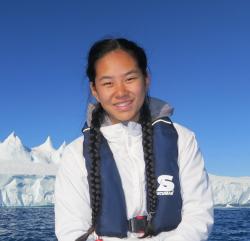
Vancouver, CanadaAge: 19
Tell us a bit about yourself!
I just completed my first year at the University of Toronto, double majoring in economics and environmental science, with the intention of working in environmental policy and sustainable development. At the regional level, I previously chaired the Vancouver School Board Sustainability Conference, to support youth leadership in environmental action and advocacy. It brought together hundreds of students from ten school districts to learn about environmental issues and solutions, cross-collaborate on ideas and initiatives, and network with community organizations and groups.
I am also the co-founder of Our Poles Our Planet, another youth-focused educational initiative dedicated to ensuring the sustainability of the polar regions. The organization started after venturing out on an expedition to the Eastern Canadian and Greenlandic Arctic, when my co-founder and I realized there was a lack of young Canadians working to preserve this region. As a result, we ran a national campaign with conferences in four cities across Canada, engaging hundreds of youth in the process.
Finally, in my spare time, I have delivered presentations and talks at various events, schools and conferences about youth empowerment and environmental action.
What inspired you to become a champion for the environment and environmental education?
I’ve always been fascinated by intersectionality in sustainability, and the translation of those concepts into public perception and policy. For me, it was the juxtaposition of having a love for nature, while living in a country that is being destroyed by the industries it depends on, that spurred my curiosity for sustainable development.
My parents are Chinese immigrants that came from humble beginnings. As a result, I was always reminded to treasure what I had, to be cautious with the choices I made, and to never waste any spare resources. This mindset evolved into my focus on sustainability. I grew up on the Pacific coast, framed by the ocean, Rockies and old-growth forests. To imagine these natural wonders eliminated or tarnished broke my heart. All I have to do is look outside to remind myself about why we do what we do. Luckily, I have been surrounded by mentors and teachers that encourage me to act on this passion, which is something I also hope to pass on to the next generation.
What advice would you give to the next generation of leaders that are looking to bring about positive change in their communities through EE?
One of the things that has surprised me the most in my work is how supportive and receptive others are when you share your passions with them. Whether it is your teacher, professor, politician, or mentor, simply reaching out and communicating your goals can be enough to kickstart an initiative. I encourage you to have the courage and persistence to voice your thoughts.
What pro-environmental behavior do you think would make a big impact if everyone in the world started doing it?
Although many citizens both enjoy and support the protection of natural areas, there is often a lack of involvement at the political level. I’d love to see more people pay attention to government proposals and laws, and voice their stance on them to ensure that what we want to see in our daily lives is actually translated into practice. For example, in addition to supporting the protection of endangered species, we can sign petitions and write letters to government officials to increase funding for specific initiatives or create larger protected areas. By doing so, we can ensure greater accountability for the government, and also guarantee the conservation of our environment.
If you could be any animal or plant, what would you be and why?
I started teaching at the Vancouver Aquarium as a public educator at the age of 14. There, I encountered two rescued harbor porpoises that I spent the majority of my time with. I can think of no better animal to represent me.
Often mistaken for baby dolphins, these small cetaceans were typically ignored by the public as they lacked the acrobatic prowess of their distant cousins. Yet, with a little patience, you will discover their incredible intelligence, undeniable curiosity, and innate sense of humor. They also have a natural optimistic appearance, with a thoughtful smile. Often traveling alone or in small pods, their quiet nature mirrors my natural introverted personality. Also, harbor porpoises are weaker and slower than dolphins, and as a result, cannot afford drawing attention to themselves since they can’t outswim their predators. I similarly lack more or less any physical ability outside of dragon boating.
Clearly, we share a love for water. Also, as a porpoise, I would be able to experience the diversity of life beneath the waves. With a range spanning the majority of coastal waters in the northern hemisphere, I could explore all of Earth’s oceans. These animals are also integral to the ecosystem, serving as a balance for fish and mollusk populations. I’d like to think I fulfill a necessary role in our world as well.